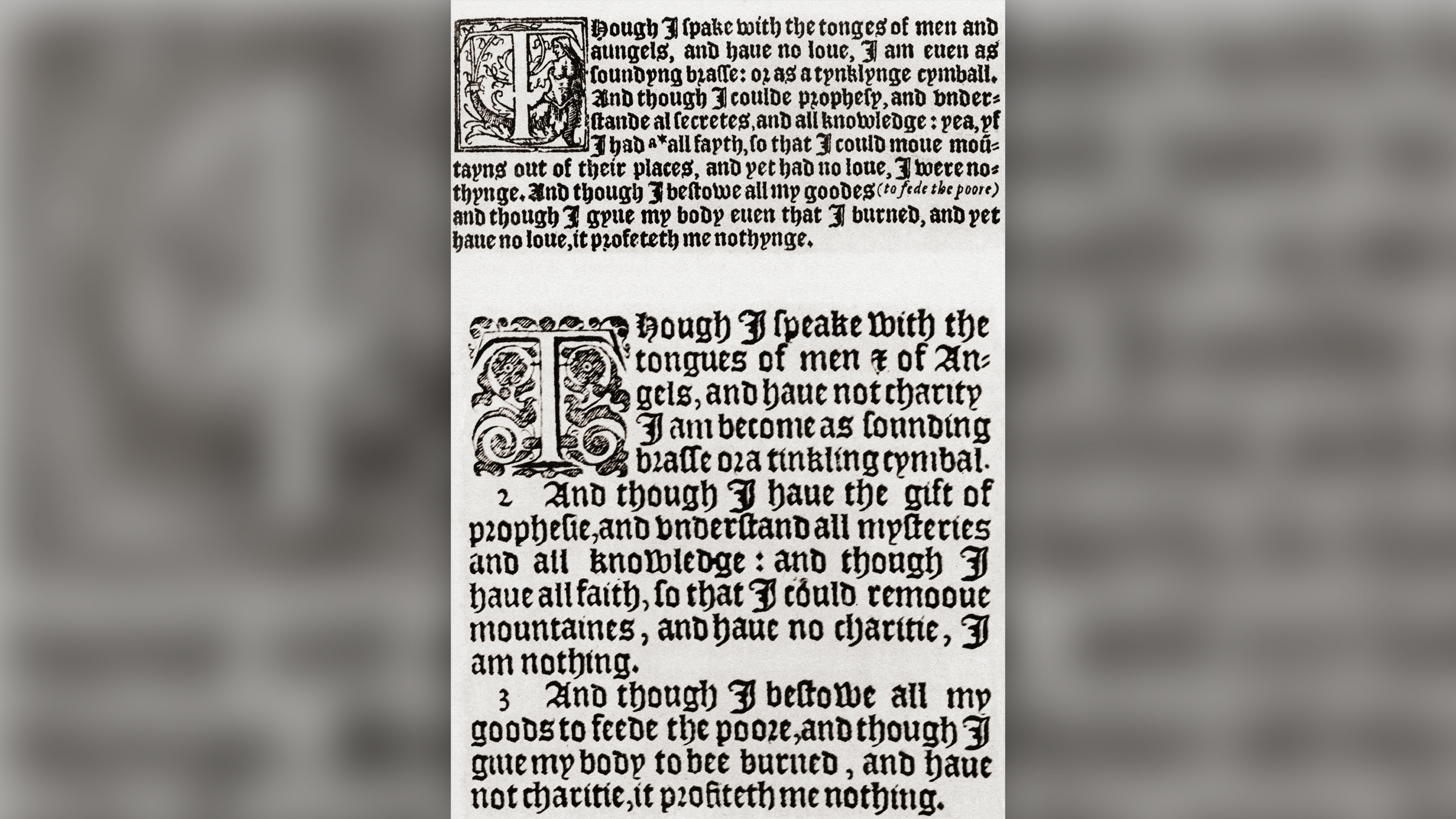New King James Audio Bible Free Download Mp3
Why is the Male monarch James Bible so pop?

Shortly afterward he ascended the English throne in 1603, King James I deputed a new Holy Bible translation that, more 400 years afterward, is still widely read around the world.
This Bible, known every bit the King James Version (KJV), helped King James leave behind a lasting cultural footprint — one of his goals as a leader. "James saw himself equally a great Renaissance effigy who wanted to impart on the world civilization, music, literature and fifty-fifty new ways of learning," Bruce Gordon, a professor of ecclesiastical history at Yale Divinity School, told Live Science.
But given the KJV'southward historic period, why is it still then popular across different Christian denominations?
Related: Why does Christianity have so many denominations?
In short, the KJV's influence has waxed over the centuries because, Gordon said, it was the version that was most widely read and distributed in countries where English was the dominant linguistic communication and that its translation was "never really challenged until the 20th century." In that time, the KJV became then embedded in the Anglo-American globe that "many people in Africa and Asia were taught English from the KJV" when Christian missionaries brought information technology to them, Gordon said. "Many people weren't fifty-fifty enlightened that it was one of many available translations," he added, "they believed the King James Version was the Bible in English language."
But at that place'due south more to the story that goes back to the translation'southward inception.
Why did King James want a newly translated Bible?
Before James commissioned the KJV in 1604, virtually people in England were learning from two different Bibles — the Church building of England's translation, unremarkably read during worship services (known as the Bishops' Bible, kickoff published in 1568), and the more pop version most Brits read at home, known equally the Geneva Bible, starting time published in 1560. The Geneva Bible was the Bible of choice among Protestants and Protestant sects, and as a Presbyterian, James likewise read that version. However, he disliked the lengthy and distracting annotations in the margins, some of which even questioned the power of a king, according to Gordon.
What's more, when James assumed the English throne in March 1603, following the decease of Queen Elizabeth I, he inherited a complicated political situation, equally the Puritans and the Calvinists — religious followers of reformer John Calvin — were openly questioning the absolute power of the Church of England's bishops. James' own female parent — Mary, Queen of Scots — had been executed 16 years before in part because she was perceived to be a Catholic threat to Queen Elizabeth's Protestant reign. "Mary's death made James keenly aware of how easily he could exist removed if he upset the wrong people," Gordon said.

To moderate such divisions, James commissioned a Bible that aimed to please both parishioners of the Church building of England and the growing Protestant sects by removing the problematic and unpopular annotations of the Geneva Bible while remaining true to the mode and translations from both Bibles that each group revered. Despite James' efforts, Gordon said, "the KJV didn't really succeed while James was live." That'south because the market for James' version didn't really arise until the 1640s, when Archbishop William Laud, who "hated the Puritans," suppressed the Geneva Bible that the Puritans followed, Gordon said.
James died from a stroke in March 1625, so he never saw his Bible get widely accepted. But even during his lifetime, later on James commissioned the translation, he didn't oversee the procedure himself. "It's well-nigh as if he got the ball rolling, then washed his hands of the whole affair," Gordon said.
Related: Was the 'forbidden fruit' in the Garden of Eden actually an apple tree?
How the KJV was translated
To oversee the translation, James commissioned six committees made upwards of 47 scholars from the universities of Oxford and Cambridge. They were tasked with translating all of the Hebrew and Greek texts of the Old and New Testaments into English language. Information technology was a complicated and sometimes contentious process that took seven years to complete. Though we don't have a lot of the records of those committees, "through our all-time reconstructions, we understand it was a very rigorous debate with anybody committed to the well-nigh accurate translation of the Bible," Gordon said.
Much of the resulting translation drew on the piece of work of William Tyndale, a Protestant reformer who had produced the first New Testament translation from Greek to English in 1525. "It'south believed that up to eighty% of the Rex James Version stems from the William Tyndale version," Gordon said.

Why is the KJV still pop today?
For a book that was published in 1611, it's amazing how influential and widely read the KJV even so is today. Though at that place are hundreds of versions and translations of the Bible, the KJV is the most popular. According to market research business firm Statistica, as of 2017, more than 31% of Americans read the KJV, with the New International Version coming in 2nd place, at 13%. Five large denominations of Christianity — Baptist, Episcopalian, Presbyterian, Latter-day Saints and Pentecostal — utilise the KJV today.
The KJV "works as both a word-for-word and sense-for-sense translation," meaning information technology acts equally both a literal translation of many of the words believed to accept been used by Jesus Christ and his Apostles and accurately conveys the meaning behind those words and events, Gordon said. One line of manuscripts used in the KJV — the Textus Receptus of Erasmus, translated from Greek to Latin by the 16th-century Dutch scholar and philosopher Desiderius Erasmus — is thought by some to be a particularly of import inclusion in the KJV, particularly for those who come across information technology as the purest line of the New Testament going back to the Churchly Age (A.D. 33 to 100), Gordon said.
Despite the KJV'south popularity throughout the centuries, Gordon said some scholars at present view parts of it as outdated. He cautioned that there have been other ancient manuscripts discovered since the KJV was commissioned that enhance scholars' agreement of some biblical events and peradventure even change the meaning of certain words.
Related: What led to the emergence of monotheism?
For example, in the mid-20th century, "many translators believed that 'maiden' or 'young woman' was a more authentic Hebraic translation to apply to describe Jesus' mother Mary, instead of 'virgin,'" Gordon said. If correct, the interpretation would have far-reaching implications every bit the Old Attestation prophet Isaiah had prophesied that the Messiah would exist born of a virgin. "Translations," Gordon said, "are non neutral things."
To that stop, many KJV readers (known every bit "King James Onlyists") don't believe the Bible should be updated at all and hold to the notion that James' version was translated from the most reliable manuscripts. What's more, Gordon said, some Onlyists believe that the scholars who oversaw the KJV translation were "divinely inspired" and that more modern translations should be disregarded because they have been "carried out past nonbelievers."
Even casual religious observers or nonbelievers are affected by the prose of the KJV Bible in ways they may not realize. Its poetic language has influenced generations of artists and activists, with many biblical phrases becoming function of our everyday language. A few examples include "the bullheaded leading the blind," "the powers that be," "my brother's keeper," "by the skin of your teeth," "a wolf in sheep'south clothing," "ascent and polish" and "get the extra mile," according to Wide Open up State. Fifty-fifty the famous opening line "4 score and vii years ago" from President Abraham Lincoln's Gettysburg Address was inspired by language used in the KJV.
Originally published on Live Scientific discipline.
DOWNLOAD HERE
Posted by: davidbettpou.blogspot.com


0 Komentar
Post a Comment